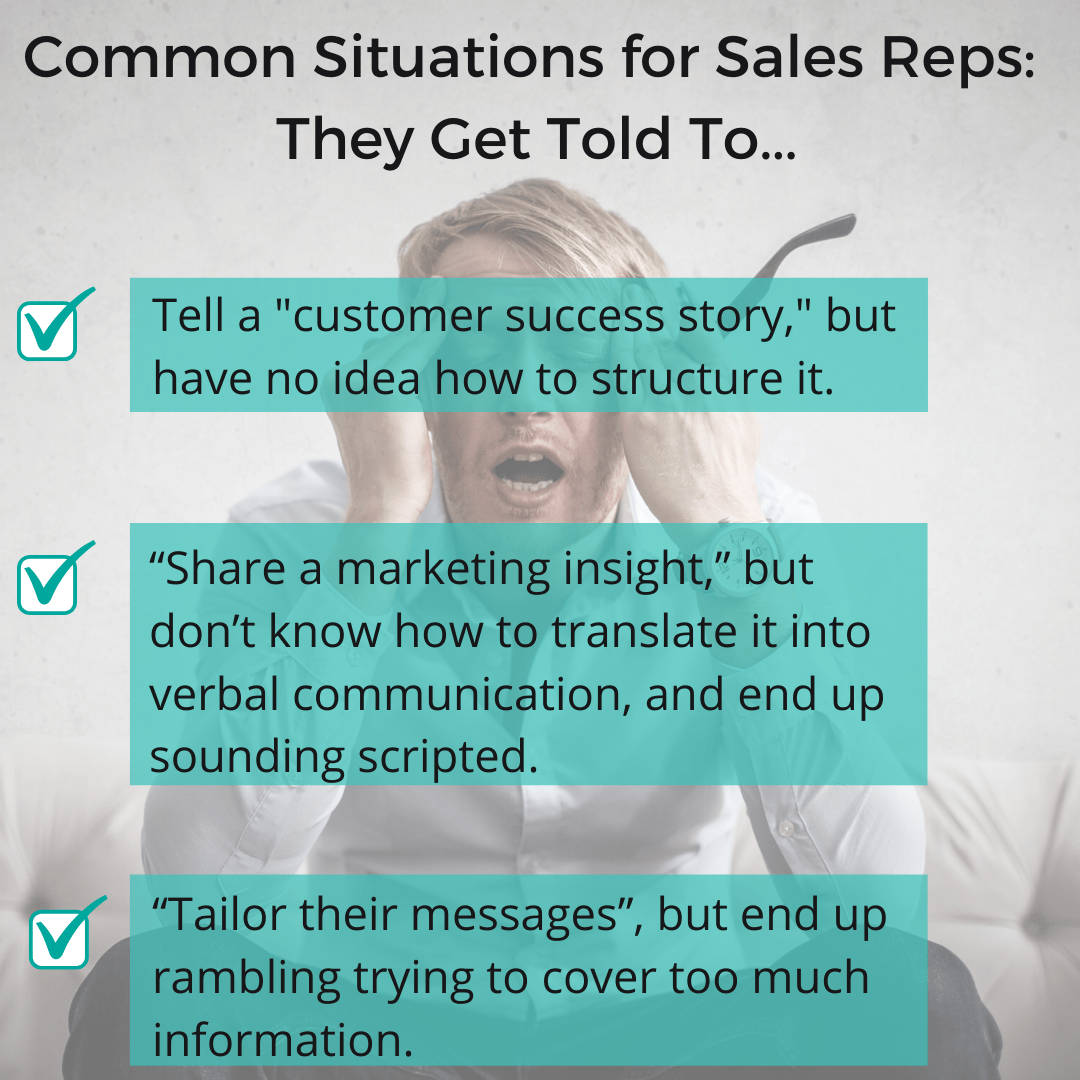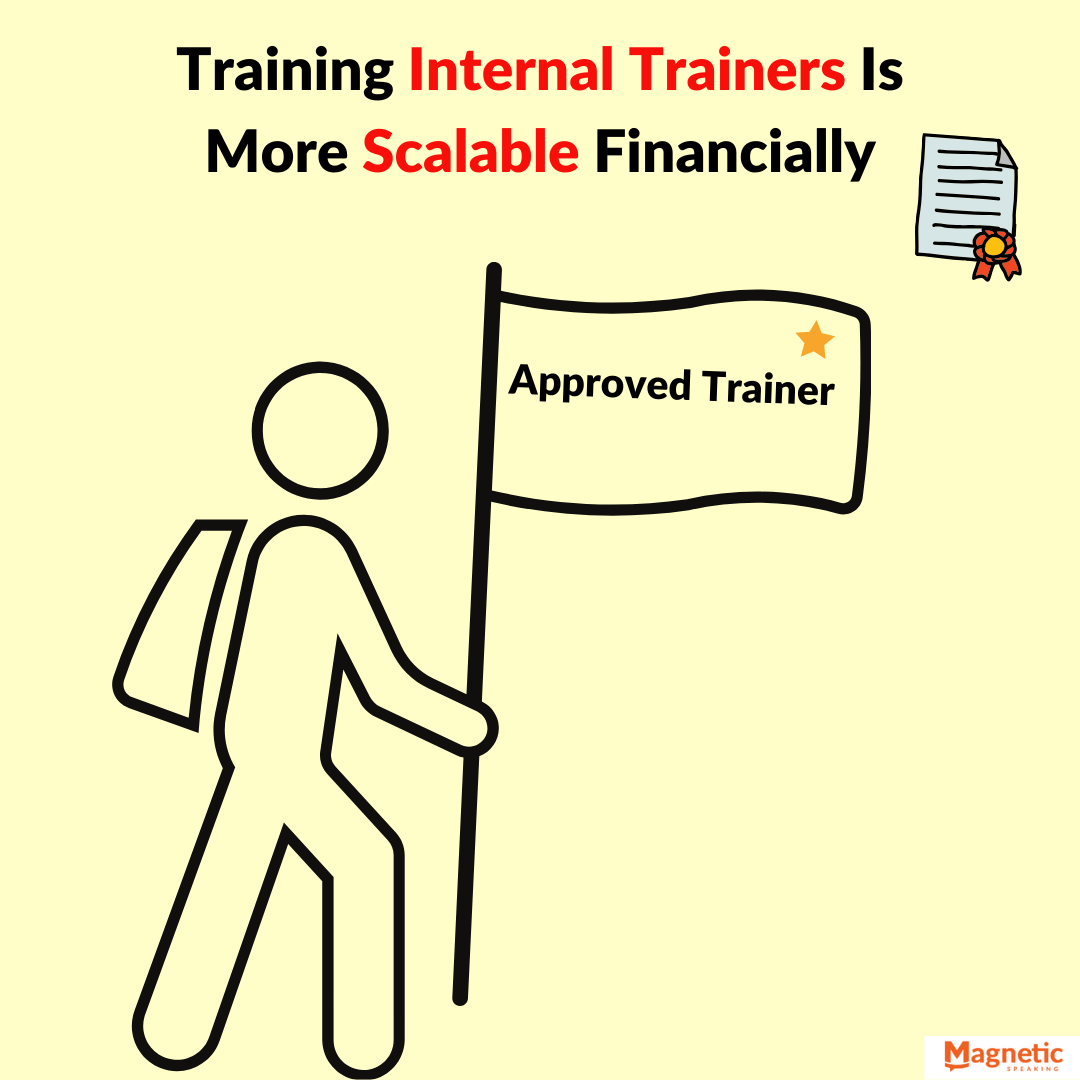Sales training programs are great. They provide the high-level pieces and organization so that sales reps know how to structure their workflows and the elements they need to succeed. Yet you’re here because your sales reps likely experience friction as you try and implement the program.
This is because sales training programs are incomplete.
The Problem
In our experience, most sales programs assume that the sales reps have their fundamental communication skills up to par. Although most sales professionals know how to communicate broadly, they lack some nuances of communication that could make their adoption of sales programs easier, faster and more productive.
These fundamental skills include comfort/confidence, messaging and storytelling. Without these fundamental skills, the rep won’t know how to implement the sales system they’re learning.

What ends up happening?
Well, the reps get frustrated, underperform or take longer to ramp up. The organization and management suffers because they experience high-turnover, longer implementation for the sales system and overwhelm in figuring out the gaps.
The Truth
When you try and implement a sales training program, the truth is that your sales reps will fall into a bell curve.
- 3% – Won’t need the sales program and will excel without it
- 94% – Need the sales program but don’t have the communication fundamentals to succeed
- 3% – Don’t care about the sales program and won’t implement it
This means that 90%+ of sales teams need to focus their efforts on not just implementing the sales program, but training their reps on fundamental communication skills because they haven’t received this training in the past.

So What Are the Communication Fundamentals Needed?
When I say fundamental communication skills, I’m not talking about objection handling, negotiation, discovery questions, etc. – those are sales skills. I’m talking about underlying communication skills that accelerate and provide the foundation for any sales skill.
Here are 3 areas they need to develop:
Delivery – Engaging and Leading
When thinking of Delivery, consider the reps’ vocal modulation (are they monotone?), use of body language, comfort, pace and engagement. Are they able to engage their prospect the whole way through? Are they expressive when they speak?
Most importantly, do they speak like a trusted yet approachable authority on the product or service?
Messaging – Framing and Clarifying
Messaging is the reps’ ability to keep their words precise, their messages tailored to the client and their meetings structured from the very beginning. Are they able to set expectations up front and clarify any objections immediately? Do they make interesting and meaningful points?
Most importantly, can they use different types of information (stories, data, analogies, etc.) in a concise way?
Storytelling – Educating and Inspiring
Storytelling is a crucial area that involves relating, educating, inspiring and reassuring the prospect. There are 6 business stories that we consider essential – The personal story, company story, customer success story, lessons learned story, hope/inspiration story and the study story.
Is the rep able to use stories seamlessly while they speak? Do their stories make a strong point? Most importantly, do they have a bank of stories that they know how to use for different situations?
By mastering these 3 areas, sales reps will boost their results and know how to implement any sales training program they’re given.
So How Can You Get the Communication Fundamentals?
So now that we’ve identified the problem and what the communication fundamentals are, let’s look at what you can do about it.
There are 2 main ways to move forward. The first is to bring in an external company to train on those fundamentals and the second is to train your internal trainers on how to teach the fundamentals.
Bring In An External Training Company
The first option is to bring in an external company to train the communication fundamentals.
This is good because the company you bring in will, ideally, have proven frameworks and in-depth training to set a proper foundation for the reps. Often, sales reps receive fundamental training on how to handle objections, negotiation, and similar sales skills but may be missing some of the basics like being concise, teaching, framing or leading the conversation.
This is why having a company train on this will be beneficial. So they can get those skills that build into the sales fundamentals.
This is something we do for clients and are always being told how valuable it is for them. We have expert trainers that are able to teach these skills to a high degree and know the material well because of the practice and training they’ve received.
In the next section, we’ll look at the difference, and benefits, of having your internal trainers trained instead of bringing in an outside organization.
Train The Internal Trainers To Teach The Fundamentals
The second option is the train-the-trainer model, where members of your internal teams are trained to teach the sales reps themselves.
You can do this by having a select group go through various certification programs so they can go teach the material. The value here is that it’s more scalable, financially.
Typically, there is an upfront certification fee and a fee per person per training on the back end. The cost per person is typically significantly less than if you were to bring in trainers from an outside organization.
We do this as well by certifying internal trainers at organizations so they can teach our material. It works well for organizations that want to reach hundreds of different people within the company instead of just segmented groups.

Obstacles
The biggest challenge for sales and L&D leaders is to justify the cost of fundamental communication training up the chain. However, we’ve seen the pitch upward to be very simple with common sense justifications.
All you have to do when communicating with leadership is to acknowledge that the sales program you have is excellent at high-level education. State that it assumes that most sales professionals have their fundamental communication skills taken care of, but that’s not the case. Mention that the sales program by itself will work – however, it will take more time unless the fundamentals are taught to the sales team separately. Usually, this does the trick and opens up the channel for further conversation and budgeting.
Conclusion
Sales training programs are great, yet they are incomplete. In our experience, most sales programs wrongly assume that the sales reps have their fundamental communication skills up to par. We help the sales team build solid communication and presentation skills so that they adopt sales programs faster and start making more sales.
If you need help evaluating your sales team’s fundamental communication skills, reach out and a training specialist will help you conduct a quick 5-minute evaluation to determine what skills your team has and what they need to work on.

